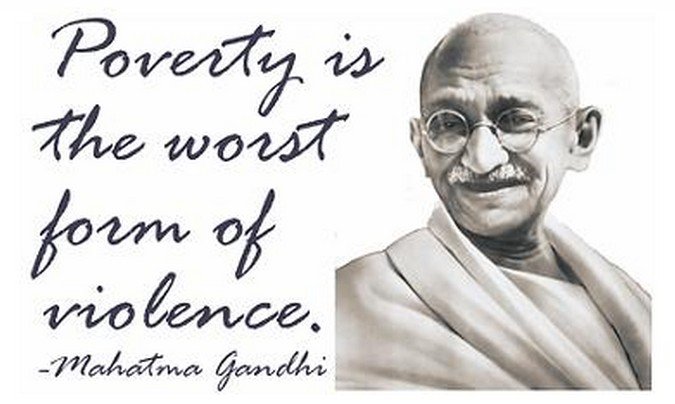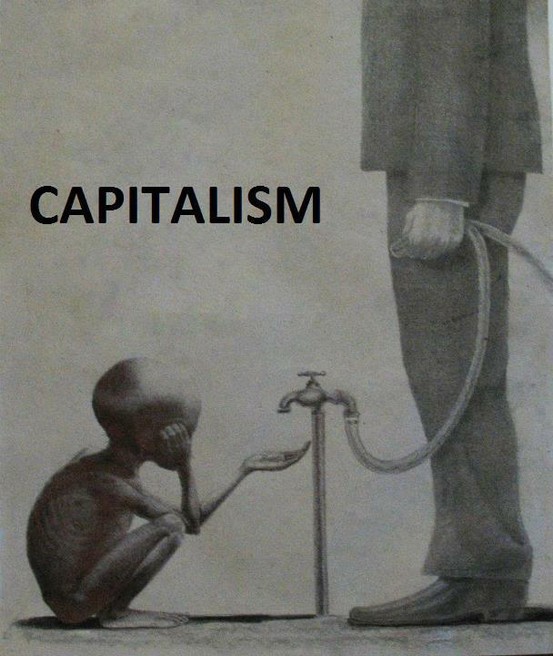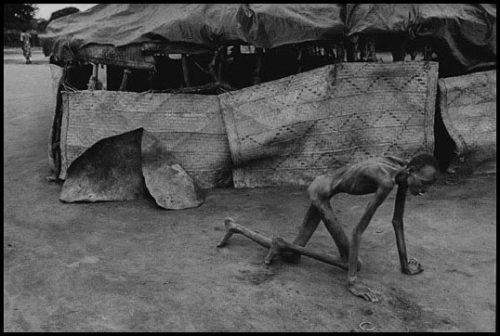A Church for the Poor
Robert W. McElroy http://en.wikipedia.org/wiki/Robert_W._McElroy



Excerpt: "Francis clearly teaches that alleviating the grave evil of poverty must be at the very heart of the church’s mission. It is neither optional nor secondary. Like war, the exploitation of undocumented immigrants and our distorted system of criminal justice, poverty is a structural sin rooted in the very life of society and government. Pope Francis attested poignantly to the reality and the impersonality of structural sin when he visited Lampedusa, where hundreds of undocumented immigrants died in a shipwreck while seeking a new life in Italy. “Who is responsible for the blood of these brothers and sisters of ours?” Francis asked. “Nobody! That is our answer. It isn’t me; I don’t have anything to do with it; it must be someone else, but certainly not me... The categorical nature of Catholic teaching on economic justice is clear and binding."
"Notable Quotations From Catholic Social And Economic Teaching Arranged By Topic"
"What The Catholic Church Teaches On Health Care Reform"
Catholic Social And Economic Teaching
Pope Francis makes addressing poverty essential

Pope Francis at a home in the Varginha slum in Rio de Janeiro on July 25.
‘How many poor people there still are in the world! And what great suffering they have to endure!” With these words the new pope explained to international diplomats assembled at the Vatican on March 22 why he chose the name Francis at the moment of his election. And since then Pope Francis has unswervingly pointed to the scandal of poverty in a world of plenty as a piercing moral challenge for the church and the whole human community.
In part, the pope’s message has called us to personal conversion, speaking powerfully to each of us about how we let patterns of materialism captivate our lives and distort our humanity. In a disarming way, Francis seeks to make us all deeply uncomfortable, so that in our discomfort we may recognize and confront the alienation from our own humanity that occurs when we seek happiness in objects rather than in relationship with God and others.
Francis’ message also has been an invitation to cultural conversion, laying bare the three false cultures that materialism has created in our world: the culture of comfort that makes us think only of ourselves; the culture of waste that seizes the gifts of the created order only to savor them for a moment and then discard them; and the culture of indifference that desensitizes us to the suffering of others, no matter how intense, no matter how sustained. Pope Francis’ words about the “globalization of indifference” echo the poignant observation of Pope Benedict in his encyclical “Charity in Truth” (2009): “As society becomes ever more globalized, it makes us neighbors but does not make us brothers.”
Alan: Most American "conservatives" would have us believe this fellow's poverty is his own fault. Or, if not his own fault, it is a circumstance that in no way requires preferential attention by free marketeers.
And finally, the pope’s message has been one of structural reform in the world. In June Francis explained: “A way has to be found to enable everyone to benefit from the fruits of the earth, and not simply to close the gap between the affluent and those who must be satisfied with the crumbs falling from the table.” Francis has made clear that the present economic slowdown cannot be an excuse for inaction. Rather, there must immediately commence “a new stimulus to international activity on behalf of the poor, inspired by something more than mere goodwill, or, worse, promises which all too often have not been kept.”
Pope Francis’ teachings on the rights of the poor have enormous implications for the culture and politics of the United States and for the church in this country. Both the substance and methodology of Pope Francis’ teachings on the rights of the poor have enormous implications for the culture and politics of the United States and for the church in this country. These teachings demand a transformation of the existing Catholic political conversation in our nation, a transformation reflecting three themes: prioritizing the issue of poverty, focusing not only on intrinsic evils but also on structural sin, and acting with prudence when applying Catholic moral principles to specific legal enactments.
Prioritize Poverty
The depth of the moral responsibility of the United States to fight global poverty arises from the tremendous power that our country exerts in the world economy. More than any other nation, the United States has the capacity to influence trading relationships, the availability of capital and market conditions. If Francis’ vision of a world with truly just trading and financial structures is to be realized, then the United States and Europe must take a leading role in reforming the existing rules that so often victimize incipient markets in staggeringly poor countries.
In addition, the United States and the richest nations of the world community have a moral responsibility to share from their plenty with the poorest peoples in the human family. In 2002 the wealthy nations of the world pledged to direct 0.7 percent of their gross domestic product toward the alleviation of dire poverty by the year 2015. This level of investment would largely eliminate severe poverty on the planet. However, the United States and most of the other leading economic powers have reneged on their commitment; today the United States only gives 0.2 percent of its gross domestic product in development assistance. As a result, millions of children die each year from disease and malnutrition that could be prevented. This is social sin, arising from individual decisions. This is the visible presence of a “global culture of indifference” that lets us avert our eyes while our governments consciously make choices to reinforce our culture of comfort while ignoring the countless human lives lost as a consequence.
Within the United States, we also turn our eyes away from the growing domestic inequality that ruins lives and breaks spirits. Pope Francis speaks directly to this: “While the income of a minority is increasing exponentially, that of the majority is crumbling. This imbalance results from ideologies which uphold the absolute autonomy of markets and financial speculation, and thus deny the right of control to States, which are themselves charged with providing for the common good.” The United States, which for so much of its great history has stood for economic mobility and a broad, comfortable middle class, now reflects gross disparities in income and wealth and barriers to mobility. The poor suffer a “benign neglect” in our political conversations, and absorb brutal cuts in governmental aid, especially at the state level.

"Plutocracy Triumphant"
If the Catholic Church is truly to be a “church for the poor” in the United States, it must elevate the issue of poverty to the very top of its political agendaIf the Catholic Church is truly to be a “church for the poor” in the United States, it must elevate the issue of poverty to the very top of its political agenda, establishing poverty alongside abortion as the pre-eminent moral issues the Catholic community pursues at this moment in our nation’s history. Both abortion and poverty countenance the deaths of millions of children in a world where government action could end the slaughter. Both abortion and poverty, each in its own way and to its own degree, constitute an assault on the very core of the dignity of the human person, instrumentalizing life as part of a throwaway culture. The cry of the unborn and the cry of the poor must be at the core of Catholic political conversation in the coming years because these realities dwarf other threats to human life and dignity that confront us today.
Structural Sin
Another part of the needed transformation in Catholic political conversation is a renewed focus on structural sin. In pursuing many vital elements of the common good, structural sin is actually more relevant than sins of intrinsic evil.
The Catechism of the Catholic Church defines the common good as “the sum total of social conditions which allow people, either as groups or as individuals, to reach their fulfillment fully and more easily.” There are three elements in the common good: respect for the fundamental and inalienable rights of the human person, the social well being and development of society, and the stability and security of a just order. The common good is primarily accomplished by the variety of social institutions—family, religious communities, economic enterprises, labor unions and service organizations—that lie outside of government. But a crucial element of the common good falls to government for its realization. John Courtney Murray, S.J., called this element “the public order.”
The mission of the Catholic community within the public order in the United States is to move in a comprehensive way to focus government on the enhancement of human rights, the development of society and social peace. Part of that movement must address issues of intrinsic evil—acts that can never be justified regardless of intentions and circumstances—like murder, genocide, abortion, euthanasia, racism, torture, suicide and slavery.
Intrinsically evil acts are always and everywhere wrong, but not all intrinsically evil acts fall within the scope of the public order and the role of government. Intrinsically evil acts like adultery and blasphemy are always wrong, but they do not lie within the jurisdiction of government. Some intrinsically evil acts, like racism, lie partly within the scope of government and partly outside. Racial discrimination in housing or unemployment must be legally proscribed, but contemptible racism expressed in private conversation generally should not. Finally, there are acts of intrinsic evil so grave and so contrary to the role of law in society that opposition to them is absolutely central to the Catholic mission of seeking the common good. Abortion and euthanasia are such issues because they involve the most fundamental duty of government to prevent the taking of innocent human life.
It is crucial to fully recognize the nature of intrinsic evil and its relationship to the common good. In recent years, however, some arguments have been broadly advanced in Catholic political conversation proposing that issues pertaining to intrinsically evil acts automatically have priority in the public order over all other issues of grave evil, like poverty, war, unjust immigration laws and the lack of restorative justice in the criminal justice system. This has the effect of labeling these other crucial issues of Catholic social teaching “optional” in the minds of many Catholics.
The statements of Pope Francis on poverty demonstrate why issues of intrinsic evil do not automatically have priority in advancing the common good.The statements of Pope Francis on poverty demonstrate why issues of intrinsic evil do not automatically have priority in advancing the common good. The category of intrinsic evil is vital in identifying the exceptionless evil inherent in certain types of actions. Poverty, however, is not a one-time action. It is the result of countless specific human actions with varying degrees of responsibility that give rise to social structures and practices imbued with selfishness and evil. The category of intrinsic evil cannot capture the type of entrenched evil inherent in poverty. Yet Francis clearly teaches that alleviating the grave evil of poverty must be at the very heart of the church’s mission. It is neither optional nor secondary.
Like war, the exploitation of undocumented immigrants and our distorted system of criminal justice, poverty is a structural sin rooted in the very life of society and government. Structural sin constitutes the effect of personal sins that collectively create social situations and institutions fundamentally opposed to divine goodness.
Pope Francis attested poignantly to the reality and the impersonality of structural sin when he visited Lampedusa, where hundreds of undocumented immigrants died in a shipwreck while seeking a new life in Italy. “Who is responsible for the blood of these brothers and sisters of ours?” Francis asked. “Nobody! That is our answer. It isn’t me; I don’t have anything to do with it; it must be someone else, but certainly not me. Yet God is asking each of us: ‘Where is the blood of your brother that cries out to me?’”
Some essential elements for advancing the common good pertain to opposing intrinsically evil acts. Some pertain to issues of structural sin. And others, as “The Splendor of Truth” (1993) reminds us, fall under the category of accomplishing great goods, like the profoundly beautiful vision of social solidarity advanced by Pope John Paul II or the pioneering reflections on stewardship and creation that Pope Benedict XVI brought to the world. There is no single category of sin or evil, social good or virtue, that is the filter for discerning the priorities of the church in the public order. The concept of the common good is multidimensional in its very nature, and any reductionist effort to minimize this quality is a distortion of our heritage and teaching.
Role of Prudence
The role of prudence has been one of the most misused elements in the Catholic political conversation in the United States in recent years. It is frequently asserted, particularly in election years, that issues pertaining to intrinsic evils do not necessitate prudential judgment, while other grave evils like war, poverty or the unjust treatment of immigrants are merely prudentially laden issues on which people of good will can disagree.
The truth is that prudence is a necessary element of any effort to advance the common good through governmental action. Moving from even the clearest moral principle to specific legislation or administrative action involves questions of strategy, prioritization and practicality. Even then, no law or program can ever encapsulate the clarity and fullness of the original moral principle.
Consider the issue of abortion, which represents probably the least complex application of clear and compelling Catholic moral principle to law. It is clear that Catholic teaching demands robust and effective legal sanctions against abortion. But should the law criminalize abortion for the mother or for those performing the abortion? Alternatively, should there be noncriminal sanctions? What is the best pathway to outlawing abortion: a series of graduated proposals beginning with parental notification and prohibitions on late-term abortion, or an immediate full court press for comprehensive prohibitions? These are questions on which people of good will can disagree in full accord with Catholic teaching, since all of these approaches seek to achieve the core principle that the law should protect the life of the unborn. Thus this is wholly different from the candidate who refuses to vote for any legal restrictions on abortion and argues that he is in fact doing more to reduce abortions by his support for aid to the poor and health care programs. Such a candidate has rejected the core substance contained in the Catholic teaching on abortion and civil law.
The core teaching of the church on the role of government in combating poverty declares that in addition to promoting conditions that provide meaningful jobs for their citizens, nations must provide a humane threshold of income, health benefits and housing. So it is with the issue of poverty.The core teaching of the church on the role of government in combating poverty declares that in addition to promoting conditions that provide meaningful jobs for their citizens, nations must provide a humane threshold of income, health benefits and housing. Just as important, as Pope Francis has repeatedly taught, wealthy nations must work ardently to reduce gross inequalities of wealth within their borders and beyond. Accomplishing these goals requires a series of complex prudential decisions about financial structures, incentives for wealth creation and income support programs that enhance rather than undermine family life. Many different types of choices are compatible within a full commitment to Catholic teachings on economic justice.

But choices by citizens or public officials that systematically, and therefore unjustly, decrease governmental financial support for the poor clearly reject core Catholic teachings on poverty and economic justice. Policy decisions that reduce development assistance to the poorest countries reject core Catholic teachings. Tax policies that increase rather than decrease inequalities reject core Catholic teachings. The nature and tone of Pope Francis’ declarations on poverty and evil in the world powerfully convey that while prudence is necessary in the formulation of economically just policies, the categorical nature of Catholic teaching on economic justice is clear and binding.


The teachings of Pope Francis on “a church for the poor” not only speak to the centrality of addressing poverty as an imperative for Catholics in the public order, but also call us to look anew at the nature of the common good in society and how we seek to achieve it. We are called to see the issues of abortion and poverty, marriage and immigrant rights, euthanasia and war, religious liberty and restorative justice, not as competing alternatives often set within a partisan framework, but as a complementary continuum of life and dignity. We are called to create a Catholic political conversation that proclaims the greatest problems of our day can only be solved with a vision rooted in the transcendent dignity of the human person. For in the end, the very purpose of Catholic political conversations is to help our nation see human suffering and human striving not through the lens of politics but as God sees them.
Comments: http://americamagazine.org/church-poor



No comments:
Post a Comment